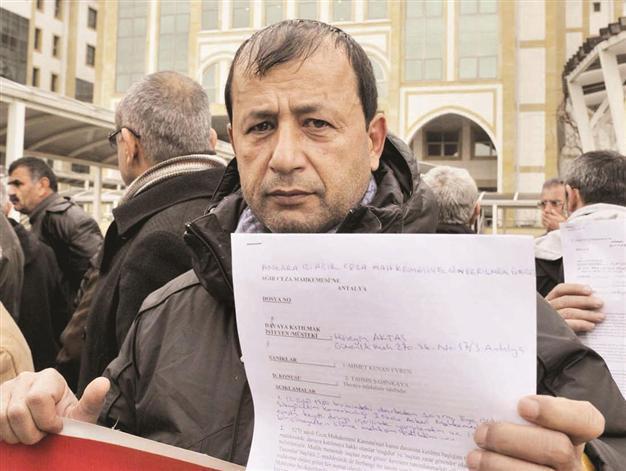Turkish Cabinet intervenes in historic ’80 coup trial
ANKARA / ISTANBUL

A man in Antalya shows his petition to intervene in the trial of 1980 coup leaders Kenan Evren and Tahsin Şahinkaya. DHA Photo
Turkey is set to witness a landmark tribunal tomorrow as Parliament considers joining 350 individuals and eight institutions with an application to become an intervening party in the trial of the architects of Turkey’s Sept. 12, 1980, coup.Former Turkish President Kenan Evren, 94, and retired Gen. Tahsin Şahinkaya, 86, face charges of “dissolving the Parliament of the Turkish Republic through use of force,” and “overthrowing the government through use of force.”
A total of eight political parties and nongovernmental organizations, as well as around 350 individuals, have already appealed to intervene in the trial against Evren, who was also the former chief of General Staff, and former Air Force Cmdr. Şahinkaya.
The Turkish Parliament, which was shut down by the coup leaders until the general elections in 1983, might soon add its name to the list of intervening parties.
“We received the indictment four days ago and have been working on it,” Parliamentary Speaker Cemil Çiçek said in an interview with NTV television yesterday. “We did some work on the contents of the charges and will make a decision when that work is over,” Çiçek said, adding that an announcement could be expected today.
Parliament’s Constitution Commission head, Burhan Kuzu, said former Prime Minister Süleyman Demirel should intervene.
“The coup was staged foremost against Demirel; therefore, he should intervene in the case,” Kuzu told reporters yesterday, adding that everyone involved in the coup should be tried, not just Evren and Şahinkaya.
The main opposition Republican People’s Party (CHP), which was shut down in the wake of the coup, will apply today to become an intervening party in the case.
Those intervening in the coup trial include the Human Rights’ Foundation of Turkey (TİHV), the Diyarbakır Bar Association, the Contemporary Lawyers’ Association (ÇHD), the Revolutionary 78’ers Federation and the Humans Rights Association (İHD).
Nejat Kangal, the head of the 78’ers Federation, an umbrella organization that brings together associations of people who were politically active before the coup, said Parliament should take a step toward scrapping the country’s current coup-era constitution without first waiting for a court verdict.
“The prosecutor has charged Evren and Şahinkaya with staging a coup. However, we want them to be tried for crimes committed both before and after the coup,” Kangal told the Hürriyet Daily News yesterday.
İHD Secretary-General Öztürk Türkdoğan said their association was founded six years after the coup, meaning that it was a result of the post-coup era regime that was struggling to correct the putsch’s injustices.
“We were founded to struggle against the mentality of Sept. 12 [coup]. The prosecutor has filed a complaint against Evren and Şahinkaya for staging the coup, that matches up with our first demand but our second demand is that [Evren and Şahinkaya] be tried for crimes against humanity. There were even some rulings of torture for imprisoned activists in Turkey’s National Security Council [MGK] records,” Türkdoğan told the Daily News.
Meanwhile, Hasan Öz, the lawyer of the families of several slain journalists and intellectuals, such as journalist Abdi İpekçi, academic Cavit Orhan Tütengil and prosecutor Doğan Öz, said key people in society were assassinated to create a chaotic situation in the country to pave the way for a coup. Öz also said the families of the murdered intellectuals would be heard as witnesses.
Tomorrow’s hearing will be attended by around 150 people, including the audience and parties that appealed to intervene in the case, according to reports.
Specially authorized prosecutor Kemal Çetin from the Ankara Chief Prosecutor’s Office prepared the indictment against the former generals in response to complaints filed from across Turkey.
Evren and Şahinkaya stand accused of attempting to forcibly overthrow the constitution and Parliament and could face aggravated life imprisonment in accordance with two articles of the Turkish Penal Code that detail “felonies against the authority of the state.”
As part of its final preparations toward the landmark case, the court also asked the Forensic Medicine Institute whether there were any health-related reasons that would prevent the two former generals from attending the hearing. The institute, however, said in a written statement yesterday that it had not yet received the court’s demand and that it would not be possible to prepare a report before the hearing.
Evren and Şahinkaya were barred from leaving the country Jan. 18 by the Ankara court where they will stand trial tomorrow. The court also rejected objections from the two suspects’ lawyers and stood by its decision to implement the travel ban.
The men’s lawyers had petitioned the court to drop the case on the grounds that the Turkish penal system recognized no such crime as “overthrowing the constitutional order.” The lawyers also argued that the legal order established by the two generals could not implicate them.
A referendum held on Sept. 12, 2010 – the 30th anniversary of the coup – ratified new amendments to Turkey’s Constitution, including the removal of a provisional article that shielded all parties implicated in the coup from standing trial on charges related to their actions during the putsch period.
















